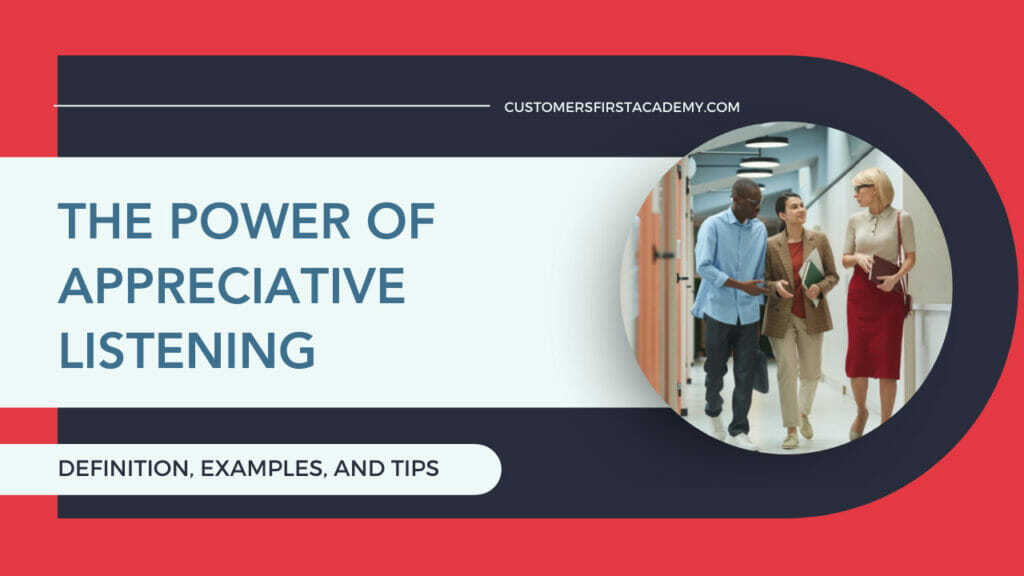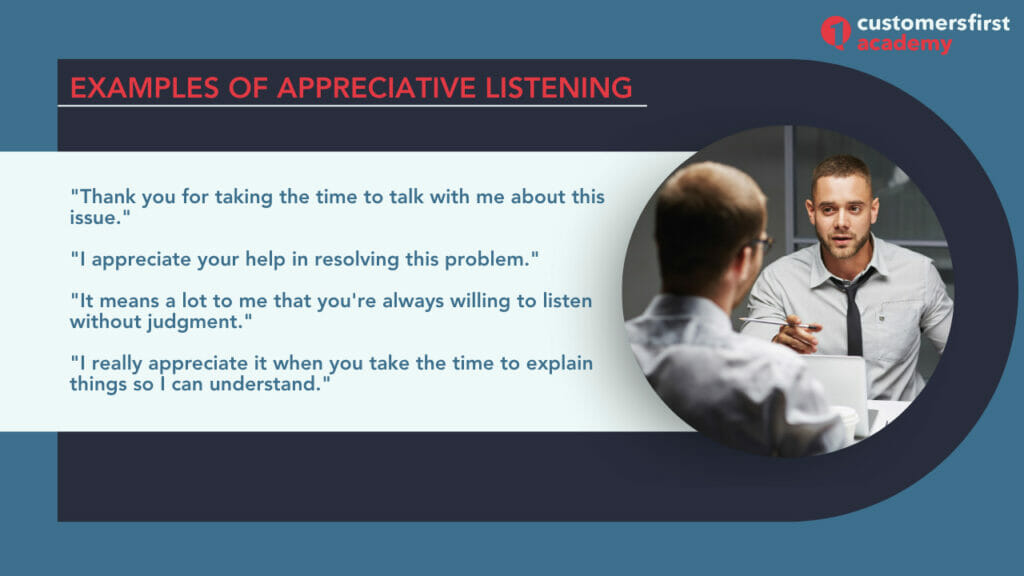Appreciative listening is a purposeful way to listen, but its power is often underestimated. It’s been shown that when we express gratitude, it can significantly impact the quality of our relationships with others.
This blog post will discuss what appreciative listening is and how it can help improve your relationships with your coworkers and customers.

Definition of appreciative listening
Appreciative listening is the act of being grateful for someone else’s time and attention when they are speaking to us.
It can be used in any situation where two or more people are interacting with each other, but it might be especially useful at work or school to convey that you are not only willing but eager to listen and help.
When to use appreciative listening at work
You can use appreciative listening in any situation to improve your relationships with others. However, it might be especially useful at work to convey that you value your coworkers and the work they do.
Below are a few examples of situations where appreciative listening might be useful to build trust and encourage cooperation:
- Interactions with colleagues
- Conflict resolution between teams
- Customer support communication
- Purposeful feedback sessions
- Team meetings
Listen and learn on the go!
Examples of appreciative listening
At work, appreciative listening can be used in any situation where two or more people interact.
Below are a few examples of appreciative listening in action:
- You give your teammates specific, positive, and actionable feedback after they share their project updates.
- Your boss takes a few minutes out of their day to listen to your ideas for improving the team’s process.
- You thank your coworker for staying late to help you get caught up on work.
When appreciative listening is used with other positive behaviors, such as active listening, it can have an even more significant impact on your relationships.
Effective appreciative listening is all about showing that you are truly interested in the other person, their ideas, and what they have to say.

Improve your listening skills and transform the way you communicate with customers!
How appreciative listening helps relationships at work
Appreciative listening is a great tool to use in the workplace. It can improve your relationship with coworkers and bosses by showing that you are willing to listen without judgment or criticism. It shows others you care about their wellbeing. This builds trust within teams because appreciative listeners are more likely to be seen as supportive rather than competitive.
Don’t take appreciative listening for granted
While appreciative listening might seem like an easy thing to do, we mustn’t take it for granted. It’s something that we should consciously make an effort to do every day in our interactions with others.
When done correctly, appreciative listening can help improve the quality of all of your relationships. It’s the little things that show others how much you care, which can positively impact your daily life and career success.
What you can say to show appreciation
There are many things you can say to show your appreciation. Some expressions of gratitude that might work well in the workplace include:
- Thank you for taking the time to talk with me about this issue.
- I appreciate your help in resolving this problem.
- It means a lot to me that you’re always willing to listen without judgment.
- I really appreciate it when you take the time to explain things so I can understand.
- It’s great that we’re able to work through issues in a mature and constructive way.
- You did an amazing job on your presentation! It was engaging and presented clearly. Thanks for taking the time to prepare for this meeting with me today.
Thanking someone for their time and attention is a great way to show appreciative listening. It lets them know you value their input and that you truly care about the relationship you have with them.
By using appreciative listening in all of your relationships, big or small, you significantly positively impact everyone around you.

How appreciative listeners act
Appreciative listeners are often seen nodding their heads and smiling while someone else speaks. They tend to lean forward when speaking, which shows they are engaged in what others are saying.
Their body language, gestures, and facial expressions demonstrate that they care about what others are saying.
They also tend to ask questions after someone has finished speaking instead of immediately jumping in with a response or idea. This demonstrates an active interest in hearing more from the speaker before giving input.
Things to avoid to improve your listening skills
There are a few things appreciative listeners should avoid doing in order to create an open communication channel with the speaker. Some of these include:
- Interrupting someone when they’re speaking – even if you have relevant experience or information that could be helpful.
- Telling someone why their idea won’t work before giving them time to explain it fully.
- Criticizing ideas without first understanding where others are coming from and what’s motivating them (e.g., fear, frustration).
- Jumping to conclusions about what someone is saying without really understanding their point of view.
When appreciative listeners don’t allow people enough time to speak, it can make others feel disrespected. It may also lead the other person not wanting to share any more opinions on this issue because they will feel like they won’t be heard.
If appreciative listeners do any of these things, it can quickly disrupt the flow of communication and damage relationships.
If appreciative listening is something you want to improve in your day-to-day life, it’s important that you avoid these behaviors. This will help create a more open and effective dialogue with people at work.
Appreciative listening in customer service
Appreciative listening is useful for providing customer service because it can help you understand your clients’ needs better. It also allows them to feel heard and respected, which in turn will make them more likely to come back again .
Customers will be able to tell that you care about their feelings and opinions – not just the sale. This might even lead customers going out of their way to refer others to your business or buying from you exclusively instead of a competitor!
When communicating with customers, appreciative listening can make a big difference. It not only keeps them engaged in the conversation, it will also help you understand what makes your customers tick and why they are choosing to buy from you .
How to handle customer complaints
When appreciative listeners hear a complaint, their first instinct is usually to listen intently before offering any sort of solution or response. Some things appreciative listeners might say when someone complains include:
- “I’m sorry this happened. That sounds frustrating. I’d feel that way too!”
- “I’m sorry that we couldn’t get it right the first time. Can you tell me more about what happened?”
- “Thank you for bringing this to our attention. We’re going to do everything we can to help you out.”
These phrases show the customer that you are taking their complaint seriously and want to resolve the situation as quickly as possible.
When appreciative listeners respond with statements like these, they’re showing empathy toward the speaker without jumping into problem-solving mode right away.
Being a positive influence on others
Appreciative listening is a powerful tool that can improve your customer service and communication skills at work. When you listen well, you’re showing the other person that their feelings matter – not just what they are saying.
This can be a valuable lesson for others as well. When you set the example of appreciative listening, it encourages those around you to do the same in their own interactions. This creates a more positive and respectful atmosphere in which open communication is possible.
Recommended Resources:
To keep learning and developing your listening skills, check out these resources:
4 Effective Steps to Use Analytical Listening in Problem Solving
The Art of Listening: 8 Qualities That Make Great Listeners
Why Listening Is Important In Communication With Customers
